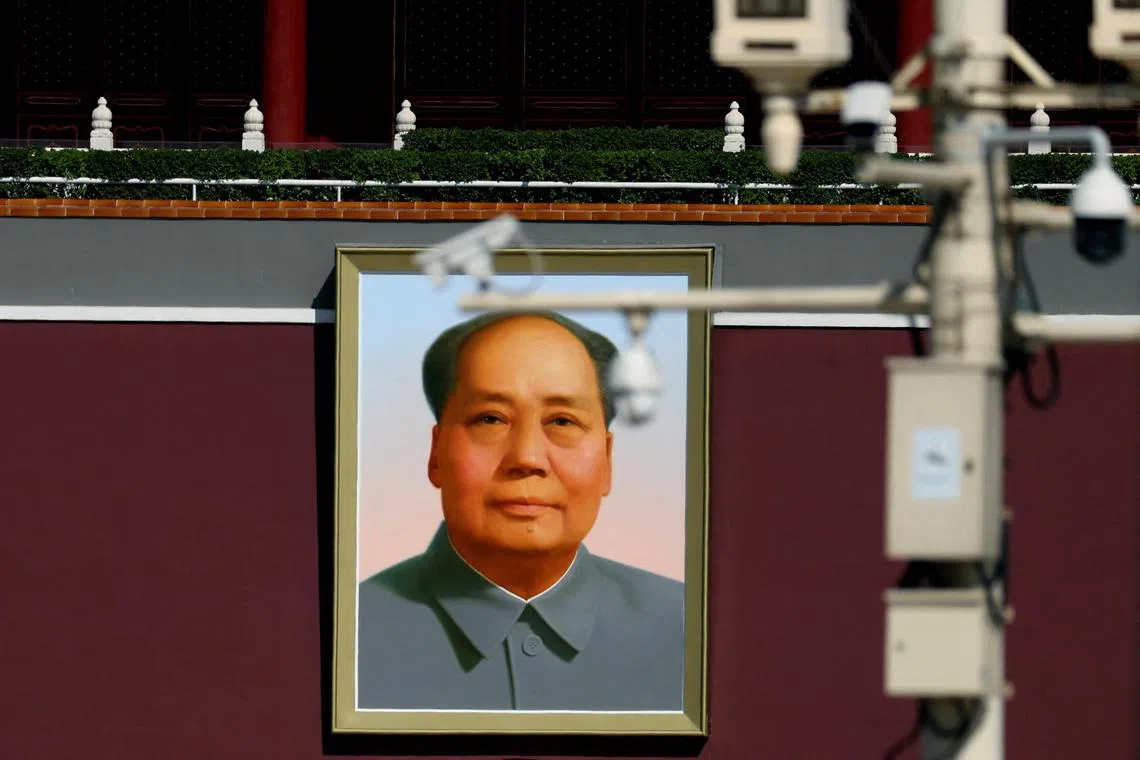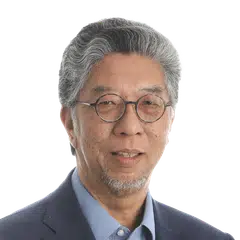Why Mao’s 130th birthday will be a muted affair
Sign up now: Get insights on Asia's fast-moving developments

Mao Zedong is one of China’s most divisive rulers.
PHOTO: REUTERS
BEIJING - When China marks Chairman Mao Zedong’s 130th birth anniversary on Dec 26, there will be no major fanfare despite the late leader’s revered status.
Official commemorations will almost certainly evoke feelings of nostalgia, something the Communist Party of China (CPC) will want to carefully manage, especially at a time of growing disenchantment among an increasing proportion of the populace.
Mr Xi Jinping will lead the six other members of the CPC’s Politburo Standing Committee – the pinnacle of power – to pay their respects at the Mao Mausoleum on Tiananmen Square in Beijing.
The local authorities at Mao’s hometown of Shaoshan in landlocked Hunan province in central-south China will try to control the number of visitors to the Great Helmsman’s birthplace.
“Commemorations will be relatively low-key to prevent leftists and rightists from hijacking it and stirring up debate,” a government insider told The Straits Times, requesting anonymity because he is not authorised to speak to foreign media.
In the years after Deng Xiaoping introduced the paradigm-shifting “reform and opening up” policy in 1978, dismantling the command economy that Mao had put in place after the founding of the People’s Republic in 1949, leftists and rightists debated whether China should embrace communism or capitalism.
In China, leftists or conservatives refer to people who support a return to socialism and state control over the economy, while rightists or liberals are those who favour constitutional democracy, individual liberty and free market reforms.
In recent years, the debate has been on the perception that the CPC prioritises state-owned enterprises over the private sector because the former is easier to control, and whether this was the right path.
The CPC is concerned that dissent could be forming among the millions of have-nots of society.
There is a growing disenchantment over a widening wealth and income gap, zero-Covid policy
Chinese youth, tired of being overworked and underpaid,
Both tang ping and bai lan come amid an increase in youth unemployment in China,
Government crackdowns in recent years on the property, health care and education sectors and the government takeover of private firms such as Anbang Insurance and Hainan Airlines have spawned fear among private investors.
“For years, we have been worried state-owned enterprises are advancing, and the private sector is retreating. There is no money to be made. Why invest?” a private entrepreneur said, speaking on condition of anonymity to avoid any repercussions.
The reluctance of private entrepreneurs to invest and a crisis of confidence are in part to blame for a slowdown in the domestic economy. Adding to the government’s woes are a mountain of bad debt and rising urban unemployment.
Commemorations marking Mao’s birth anniversary need to be measured and austere amid the backdrop of the plethora of problems facing the CPC.
State television and cable networks have produced tribute programmes for this year’s anniversary, such as a 33-episode TV historical drama “Dadao Xinhuo” (The Great Path with Sparks) and a 32-episode TV series “Wen Cang Mang” (The Forerunner), but keeping them to the early years of Mao’s revolutionary exploits.
Demi-god or mortal?
Mao is one of China’s most divisive rulers.
He is fondly remembered for making China egalitarian, albeit poor. He forced thousands of landowners and merchants to hand over their private property and nationalised industries and businesses.
Chest-thumping hawks hail Mao a military genius. He took China to war three times, claiming victory after the 1950-53 Korean War ended with the inking of an armistice. He took on “Big Brother” the Soviet Union in their 1969 border war and taught neighbour India a lesson in their border war in 1962.
Under Mao, China stood up when it joined the nuclear club in 1964, a milestone that paved the way for the world’s most populous nation then to oust Taipei and take the China seat in the United Nations in 1971.
Official corruption, prostitution, drug abuse and gambling had been virtually wiped out in Mao’s puritan China, but have staged a comeback in the past four and a half decades, causing some to question the reform and opening up policy.
Not all Chinese worship Mao, though. Survivors of the horrors of the 1966-76 Cultural Revolution and the bereaved families of victims would agree with the late conservative economic czar Chen Yun, that Mao was a “sinner”.
But for the have-nots, Mao was and still is a demi-god.
In focusing on Mao’s early revolutionary years and frugality, the CPC is determined to prevent liberal intellectuals from resurrecting a debate about the Cultural Revolution, which has officially been acknowledged as a mistake. The last thing the CPC needs at this juncture is demands for an official apology and to pay compensation to survivors.
Neither would the CPC want the cult of personality around Mao to be revived by leftists who favour a return to more egalitarian days.
If anything, there have been attempts to strike a balance between Mao’s contributions and his policy mistakes, not least by Mr Xi himself.
“Revolutionary leaders are not gods, but human beings,” Mr Xi said at an event to commemorate Mao’s 120th birth anniversary in 2013.
“(We) cannot worship them like gods or refuse to allow the people to point out and correct their mistakes just because they are great,” he said. “Neither can we totally repudiate them and erase their historical feats just because they made mistakes.”
Commemorations on Dec 26 are likely to be similar to that in 2013 when Mr Xi spoke at a symposium at the Great Hall of the People in Beijing and members of the Standing Committee bowed three times before a statue of Mao at the mausoleum and paid their respects to his embalmed remains.
The CPC has every reason to make sure commemorations will be as low-key as possible to avoid rekindling unwanted debates.



